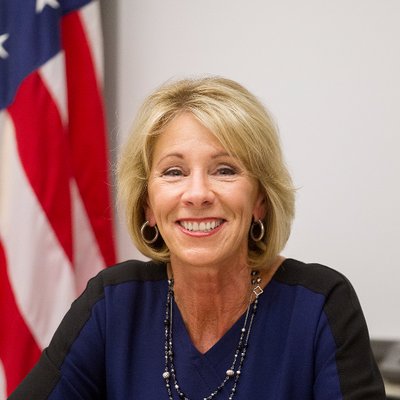By Joergen Ostensen and Michael Fissinger

Professor Cheryl Bader teaches a criminal defense clinic at Fordham Law School where they represent people who are accused of misdemeanor crimes. Before that she was a prosecutor at the U.S. attorney’s office in New Jersey and also worked for a federal judge.
The Fordham Ram interviewed Bader about Secretary of Education Betsey DeVos’s decision to review how Title IX is used in investigating sexual assault at the nation’s universities.
The Fordham Ram: Do you know how Title IX came to be used in the context of sexual assault cases?
Bader: People often think of Title IX as making sure that there is parity between female and male varsity athletes. That’s probably what it’s more known for. But basically the statute prohibits any form of discrimination on the basis of gender or sexual orientation. So sexual assault is a form of gender discrimination, or discrimination on the basis of sex. Having a pervasive climate where sexual assault and harassment is tolerated violates Title IX.
The Fordham Ram: Was there a noticeable change when Obama-era campus assault and harassment policies went into place back in 2011?
Bader: I think there has been more of a shining of a light on this issue. Sexual assaults on college campuses have been happening for decades and decades. It largely went unreported or under-reported. There was an attitude in many colleges that this was something they would rather sweep under the rug than address head on. I think the Obama administration was successful in helping to focus on the problem. I think the problem is more in the public eye than it had been in the past. The Dear Colleague Letter was a letter reminding colleges that had been slow to take these issues seriously that Title IX requires this and if they want to be the beneficiaries of federal funding they need to make sure they are not fostering a climate where sexual harassment and assault go unaddressed and unpunished.
The Fordham Ram: So you see a change in the attitude toward campus sexual assault and harassment during the Obama administration?
Bader: I don’t have statistics or data to say that I would attribute a change…I think that setting a tone and recognizing that this is a real issue that needs to be addressed. Asserting a willingness to take steps and to remind those universities that are not otherwise stepping up is an important [part] of the leadership of the administration. Trying to roll back those policies to potentially pander to a part of the Trump administration’s base seems foolhardy.
The Fordham Ram: Do you see these comments by DeVos as potentially bringing a change to the tone that the Obama administration set?
Bader: Yes… I think that universities that are thoughtful about this and don’t want to perpetuate a toxic atmosphere on campus are going to continue to address incidents of sexual harassment in a serious and thoughtful way. I don’t think they need to necessarily be told by Betsy [DeVos] what to do. I think it’s very hurtful to victims that endure the trauma of the assault and then endure the post-trauma of being told that their experience is less important than the experience of the accused.
The Fordham Ram: One of the things Secretary DeVos stressed was getting public feedback on the issue. Do you think this is an issue that warrants public feedback or should be left just to the professionals?
Bader: I think it’s always important to have public discourse on an issue…Now that there has been a greater spotlight on the issue, I think we learned that it had not been properly addressed and that there was quite a bit of trauma to victims and that victims were not willing to come forward and report for fear of reprisal or being blamed. I think that now that we have greater understanding of how pervasive the problem is and how it’s gone largely unaddressed, we need to take steps to correct the situation and [not] cut off continued discourse. We don’t say, “We’re going to put the criminal justice system on hold and get some opinions about it.” [DeVos] has expressed concern about the due process rights of those who are accused, but I see that the Trump Administration doesn’t seem to have the same concern about due process rights of people who are being stopped and frisked and whose rights are being violated in marginalized communities of color. I understand that she’s the Education Secretary, but in the administration, Jeff Sessions is looking to roll back Obama Administration policies, that have worked, to go back to days of mass incarceration, and they don’t seem to be worrying too much there about due process rights.
The Fordham Ram: One of the things that struck me about these comments from DeVos is that she’s really talking about entertaining “both sides” of the issue. That reminded me of Trump’s comments after Charlottesville. Do you see a connection there and if so, do you see that as a trend in the Administration? What is the significance of DeVos stressing fair due process for the accused?
Bader: As a defense attorney, I am all in favor of someone who is accused of wrongdoing being able to have a fair and just process. To the extent that [DeVos] wants to paint with a broad brush, that whenever there’s a dispute, you can equate two sides of the dispute on the same moral footing I think is a very narrow way of looking at a conflict. If she were really interested in reform efforts that could work that involve giving a voice to all sides, one of the things as Education Secretary that she might want to explore is having more restorative justice processes. Restorative justice is an alternative way of resolving conflicts, even conflicts that would be considered criminal in nature. The person who is aggrieved could voice their grievance; the person who’s the responsible party can listen and also give voice to what they’ve experienced. When there’s a rip in the fabric of our society, one way to look at it is how can we restore and repair rather than accuse and punish. [Restorative justice] has been a very cathartic, positive process. It may be that in some cases of sexual violence, it may not be a process that the victim or accused wants to participate in; in many [cases] it may be a process that each side is willing to participate in and could be a very productive process that lets people express their grievance, their remorse, and how can we move forward and repair somebody who’s been victimized.








































































































































































































